(UroToday.com) In this discussion, Sven Perner, MD, PhD, elaborated on the various molecular subtypes of prostate cancer. It has been shown that there are potentially actionable mutations in 25% of cases in the PIK3CA/MAPK signaling pathway and almost 20% alteration in DNA damage repair genes (Figure 1).
Figure 1 – Alterations in clinically relevant pathways in prostate cancer: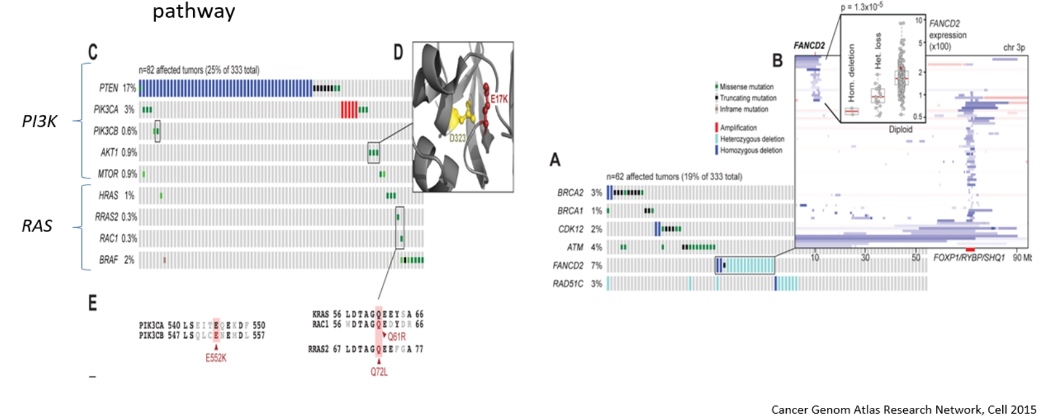
It has also been shown that alterations in DNA damage repair genes are highly common in advanced prostate cancer, as shown in the paper by Pritchard CC et al. published in the New England Journal of Medicine in 20161 (Figure 2). This study showed that BRCA1, BRCA2, and ATM alterations were present in 11% of cases of primary prostate cancer. Moreover, BRCA1, BRCA2, ATM, CHEK2 alterations were present in 19% of metastatic prostate cancer patients, with approximately half of these alterations being germline mutations.
Figure 2 – Mutations in DNA damage repair genes in prostate cancer: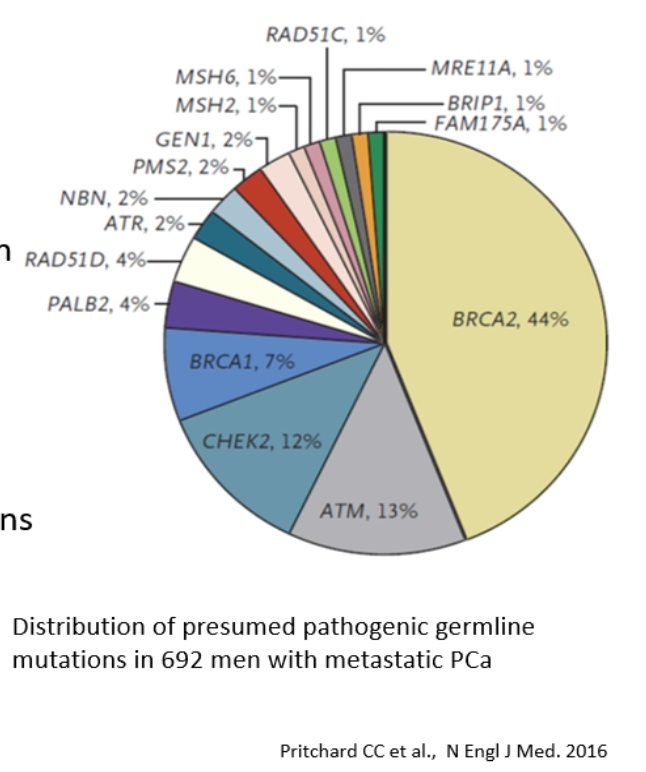
The more common selected key genes in the pathway of DNA damage repair deficiency in prostate cancer include BRCA1, BRCA2, ATM, PALB2, CHEK2, AND RAD51, which are present in 20% of aggressive primary prostate cancer and castrate-resistant prostate cancer (Figure 3). These have been shown to respond better to PARP inhibitors. There is currently a plethora of trials in progress assessing PARP inhibition in prostate cancer (Table 1), and there are specific trials examining the role of PARP inhibition, specifically in metastatic prostate cancer (Table 2).
Figure 3 – DNA damage repair deficiency in prostate cancer: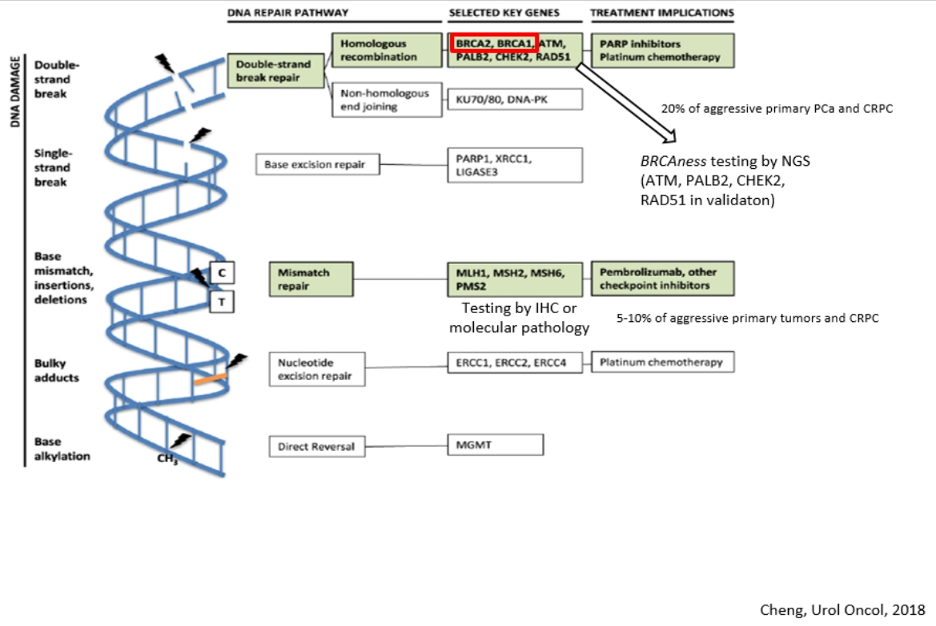
Table 1 – PARP inhibition trials in prostate cancer: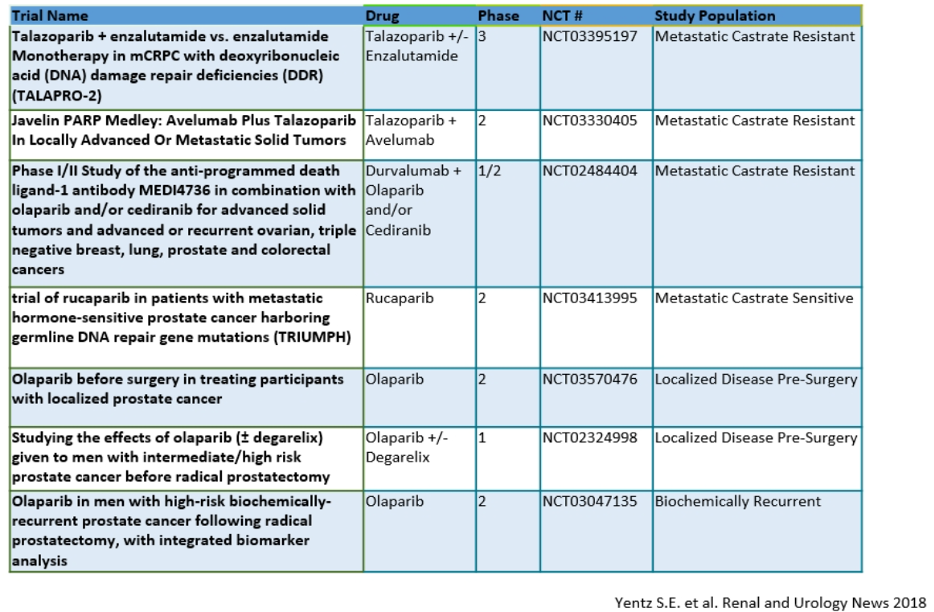 Table 2 – PARP inhibition trials in metastatic prostate cancer:
Table 2 – PARP inhibition trials in metastatic prostate cancer: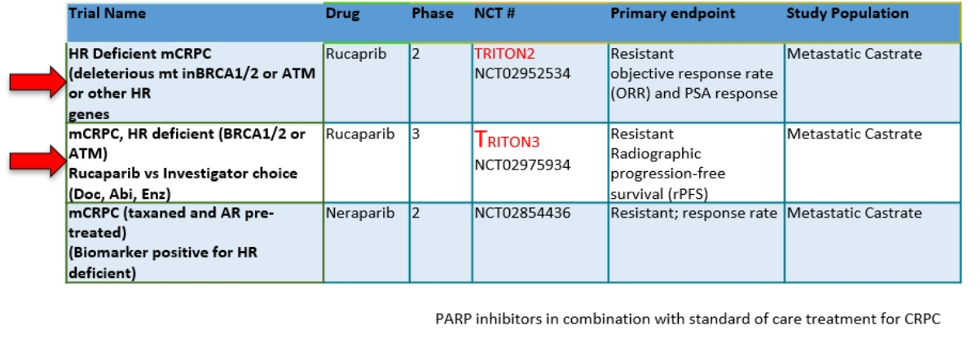
There is also increasing evidence that patients with microsatellite instability-high and mismatch repair deficient advanced prostate cancer could benefit from PD1/PDL therapy2. Importantly, only 3% of prostate cancer cases show this kind of phenotype. Of those patients, only a small part would respond to therapy with PD1/PDL1.
There have been several studies specifically assessing mutations in DNA damage repair mechanisms and the treatment that was used for these specific patients:
- Mateo et al. TOPARP-B, 2019 demonstrated response to PARP inhibitor that was greatest among people carrying BRCA1, BRCA2, or PALB2 mutations3
- Annala et al. Cancer Discovery, 2018 demonstrated DDR mutation being associated with poor clinical outcomes on treatment with abiraterone or enzalutamide4
- Castro et al. JCO 2017 showed that DDR germline mutation is associated with poor outcomes on treatment with abiraterone or enzalutamide5
- Velho et al. Eur Urol 2019, showed that patients with inherited or acquired DNA repair gene mutations derive greater benefit from radium 2236
- Antonarakis et al Eur Urol 2018 Showed the patience with DDR mutations are sensitive to pembrolizumab7
- Hussain et al. JCO 2018, showed that patients with DDR mutations had a longer progression-free survival after treatment with abiraterone and veliparib
Dr. Perner believes that all patients with metastatic prostate cancer should be offered somatic genomic testing of tumor tissue for HRD and MMR defects. Moreover, all patients with metastatic, regional, very high-risk disease or high-risk disease regardless of family history should be considered for germline testing (NCCN testing).
Neuroendocrine prostate cancer is unique because it harbors high DLL3 expression NEPC. The anti-DLL3-monoclonal antibody could be a potential predictive biomarker for treatment. There are currently encouraging preclinical and phase 1 data on this monoclonal antibody8.
Dr. Perner concluded and mentioned that amplification, mutation, and splicing variants of Androgen receptor variants (AR-V7) are frequent and relevant in castration-resistant prostate cancer. AR amplifications are predictive for response to abiraterone and enzalutamide (Figure 4). AR amplification and AR-V7 expression are prognostic in CRPC. AR-V7 may be predictive, however, no testing decisions are currently being made based on AR-V7 expression. To date, tissue-based AR alteration assessment is not part of the clinical routine.
Figure 4 – AR-V7 predicts therapy resistance against abiraterone and enzalutamide: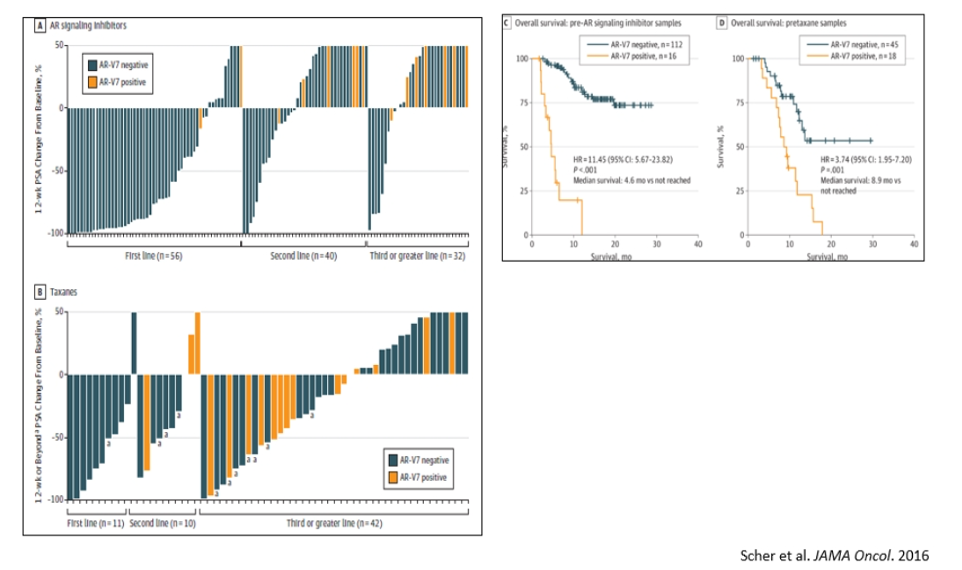
Presented by: Sven Perner, MD, PhD, Professor and Chairman, University Hospital Schleswig-Holstein, Luebeck, Germany
Written by: Hanan Goldberg, MD, MSc., Urology Department, SUNY Upstate Medical University, Syracuse, NY, USA, @GoldbergHanan at the 35th Annual EAU Congress, 2020 Virtual Program #EAU20, July 17-19, 2020.
References:
- Pritchard CC, Mateo J, Walsh MF, et al. Inherited DNA-Repair Gene Mutations in Men with Metastatic Prostate Cancer. New England Journal of Medicine 2016; 375(5): 443-53.
- Abida W, Cheng ML, Armenia J, et al. Analysis of the Prevalence of Microsatellite Instability in Prostate Cancer and Response to Immune Checkpoint Blockade. JAMA oncology 2019; 5(4): 471-8.
- Mateo J, Porta N, Bianchini D, et al. Olaparib in patients with metastatic castration-resistant prostate cancer with DNA repair gene aberrations (TOPARP-B): a multicentre, open-label, randomised, phase 2 trial. The Lancet Oncology 2020; 21(1): 162-74.
- Annala M, Vandekerkhove G, Khalaf D, et al. Circulating Tumor DNA Genomics Correlate with Resistance to Abiraterone and Enzalutamide in Prostate Cancer. Cancer Discovery 2018.
- Castro E, Romero-Laorden N, Pozo Ad, et al. PROREPAIR-B: A Prospective Cohort Study of the Impact of Germline DNA Repair Mutations on the Outcomes of Patients With Metastatic Castration-Resistant Prostate Cancer. Journal of Clinical Oncology 2019; 37(6): 490-503.
- Isaacsson Velho P, Qazi F, Hassan S, et al. Efficacy of Radium-223 in Bone-metastatic Castration-resistant Prostate Cancer with and Without Homologous Repair Gene Defects. European Urology 2019; 76(2): 170-6.
- Antonarakis ES, Lu C, Luber B, et al. Germline DNA-repair Gene Mutations and Outcomes in Men with Metastatic Castration-resistant Prostate Cancer Receiving First-line Abiraterone and Enzalutamide. Eur Urol 2018; 74(2): 218-25.
- Puca L, Gavyert K, Sailer V, et al. Delta-like protein 3 expression and therapeutic targeting in neuroendocrine prostate cancer. Sci Transl Med 2019; 11(484): eaav0891


